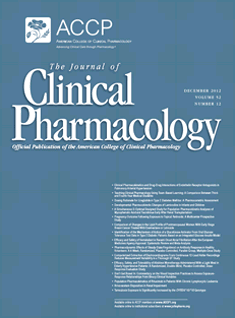
JOURNAL OF CLINICAL PHARMACOLOGY
Scope & Guideline
Innovating Insights in Clinical Pharmacology
Introduction
Aims and Scopes
- Clinical Pharmacokinetics and Pharmacodynamics:
The journal extensively covers studies that explore the pharmacokinetics (how drugs move through the body) and pharmacodynamics (the effects of drugs on the body). This includes population pharmacokinetic models, therapeutic drug monitoring, and the impact of genetic variations on drug metabolism. - Drug Safety and Pharmacovigilance:
Research published in the journal frequently addresses drug safety, adverse drug reactions, and pharmacovigilance. It aims to identify and analyze risks associated with medications, contributing to improved patient safety through better understanding and reporting of adverse events. - Therapeutic Drug Monitoring (TDM):
The journal emphasizes the importance of TDM in optimizing drug therapy, particularly for drugs with narrow therapeutic indices. Studies often focus on methodologies for TDM, including population pharmacokinetic modeling and individualized dosing strategies. - Pharmacogenomics:
There is a significant focus on pharmacogenomic studies that investigate how genetic differences affect individual responses to drugs. This area aims to personalize medicine by tailoring drug therapies based on genetic profiles. - Clinical Trials and Evidence-Based Medicine:
The journal publishes findings from clinical trials, systematic reviews, and meta-analyses that contribute to evidence-based practice in pharmacology. It seeks to provide clinicians with reliable data to inform their prescribing practices.
Trending and Emerging
- Integration of Artificial Intelligence and Machine Learning:
Recent publications indicate a growing interest in employing AI and machine learning techniques for drug development, personalized medicine, and predicting drug interactions. This trend reflects the broader technological advancements in healthcare. - Focus on Drug-Drug Interactions:
There is an increasing emphasis on understanding drug-drug interactions, particularly in populations at risk, such as the elderly or those with comorbidities. This trend is vital for ensuring patient safety and optimizing therapeutic regimens. - Chronic Disease Management and Pharmacotherapy:
Research addressing pharmacotherapy in chronic diseases, such as diabetes, hypertension, and heart failure, is on the rise. This focus underscores the importance of effective medication management in improving long-term health outcomes. - Personalized Medicine and Tailored Therapies:
The journal is increasingly publishing studies that explore personalized medicine approaches, including pharmacogenetics and individualized dosing strategies, to enhance therapeutic efficacy and minimize adverse effects. - Addressing Public Health Issues:
Emerging themes include the role of pharmacology in public health crises, such as the COVID-19 pandemic. Research focusing on vaccine safety, therapeutic interventions for infectious diseases, and drug repurposing is gaining prominence.
Declining or Waning
- Traditional Pharmacotherapy Approaches:
Research focusing on conventional pharmacotherapy methods, such as older drug classes without significant updates or innovations, appears to be waning. This shift may be due to the increasing interest in personalized medicine and novel therapeutic agents. - General Population Studies:
There is a noticeable decline in publications centered around broad population studies without specific clinical applications. The trend is moving towards more targeted research that addresses specific patient populations or conditions. - Drug Utilization Reviews without Clinical Implications:
Studies that review drug utilization patterns without providing actionable clinical insights or recommendations are becoming less common, as the journal prioritizes research that translates into clinical practice.
Similar Journals
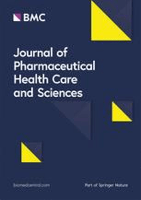
Journal of Pharmaceutical Health Care and Sciences
Pioneering research at the forefront of pharmaceutical health care.The Journal of Pharmaceutical Health Care and Sciences is a premier open access journal published by BMC that aims to advance the field of pharmaceutical sciences by providing high-quality research and comprehensive reviews across various domains including pharmacology, nursing, and healthcare. With an impact factor reflecting its relevance and rigor, the journal has established itself as a significant platform for disseminating knowledge since its inception in 2015. The journal is indexed in Scopus, currently holding a position in the Q3 quartile for medical pharmacology and Q2 quartile for nursing pharmacology, indicating its growing influence and reach in the scientific community. Based in the United Kingdom with a commitment to open access, the Journal of Pharmaceutical Health Care and Sciences ensures that all researchers, professionals, and students have free access to vital research that fosters innovation and improves healthcare outcomes worldwide. With a focus on collaborative and multidisciplinary approaches, the journal invites contributions that align with its objectives of enhancing health care delivery and pharmaceutical practices.
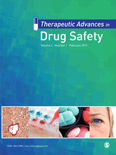
Therapeutic Advances in Drug Safety
Empowering Global Health through Drug Safety InnovationTherapeutic Advances in Drug Safety is a prestigious open-access journal published by SAGE Publications Ltd that has made significant strides in the field of pharmacology since its inception in 2010. With an impressive impact factor that places it in the Q1 category for Pharmacology (medical), this journal ranks 61st out of 272 in Scopus, showcasing its global influence and commitment to advancing drug safety research. Based in the United Kingdom, it aims to bridge the critical gap between pharmacological innovation and clinical application, offering a platform for the dissemination of groundbreaking research, case studies, and expert reviews. Since adopting an Open Access model in 2019, the journal has significantly increased its reach, ensuring that vital findings in drug safety are accessible to researchers, healthcare professionals, and educators worldwide. As the field of drug safety continues to evolve, Therapeutic Advances in Drug Safety remains an essential resource for those dedicated to enhancing safe therapeutic practices and patient outcomes.
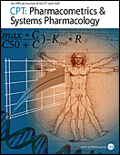
CPT-Pharmacometrics & Systems Pharmacology
Exploring the future of drug development and patient safety.CPT-Pharmacometrics & Systems Pharmacology, published by WILEY, is a leading open access journal dedicated to advancing the fields of pharmacometrics and systems pharmacology. Since its inception in 2012, it has established itself as a vital resource for researchers and practitioners, boasting a remarkable impact factor and occupying prestigious Q1 quartiles in categories such as Cardiology and Cardiovascular Medicine, Modeling and Simulation, and Pharmacology (Medical). The journal covers a broad spectrum of topics aimed at enhancing the understanding of drug development, efficacy, and patient safety through innovative modeling and simulation approaches. With its consistent ranking in the top tiers of its field, CPT-Pharmacometrics & Systems Pharmacology provides invaluable insights and fosters scholarly dialogue among its audience, including researchers, educators, and students. The journal is accessible to all, promoting knowledge dissemination and collaborative growth in the pharmacology community.

CLINICAL PHARMACOLOGY & THERAPEUTICS
Leading the way in pharmacology and therapeutics excellence.CLINICAL PHARMACOLOGY & THERAPEUTICS, published by WILEY, stands at the forefront of pharmacological research, serving as a pivotal resource for researchers, healthcare professionals, and students in the medical field. With its prestigious Q1 rating in both Pharmacology and Pharmacology (medical) categories, and ranking in the top 4% of journals in the field, it provides cutting-edge insights into drug therapy, pharmacokinetics, and innovative treatment strategies. The journal features a wide range of articles, from original research to comprehensive reviews, all aimed at advancing knowledge and clinical practice in pharmacology. With a publication history dating back to 1960 and continuing through 2024, its commitment to excellence is evident in its robust impact factor and high visibility in the academic community. For professionals striving to stay at the forefront of pharmacological advancements, CLINICAL PHARMACOLOGY & THERAPEUTICS remains an essential platform for disseminating and accessing vital research findings.

CLINICAL PHARMACOKINETICS
Illuminating Pathways in Clinical PharmacologyCLINICAL PHARMACOKINETICS, published by ADIS INT LTD, is a premier journal dedicated to the field of pharmacology, with a distinguished reputation since its inception in 1976. With an impressive impact factor and categorized in the Q1 quartile for both general pharmacology and medical pharmacology, this journal ranks #29 out of 272 and #53 out of 313 in its respective categories in Scopus, highlighting its high academic influence and the quality of research it publishes. CLINICAL PHARMACOKINETICS serves as a vital resource for researchers, professionals, and students interested in the latest advancements in drug metabolism, therapeutic efficacy, and clinical applications of pharmacokinetic studies. As it continues to evolve through 2024 and beyond, the journal remains committed to fostering a deeper understanding of pharmacotherapy and its implications in clinical practice. While it does not currently offer open access, the journal ensures that cutting-edge research is accessible through various academic platforms.
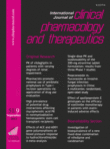
INTERNATIONAL JOURNAL OF CLINICAL PHARMACOLOGY AND THERAPEUTICS
Unveiling the science behind effective therapeutics.INTERNATIONAL JOURNAL OF CLINICAL PHARMACOLOGY AND THERAPEUTICS, published by DUSTRI-VERLAG DR KARL FEISTLE in Germany, is a vital scholarly platform dedicated to advancing the field of pharmacology through rigorous research and innovative therapeutic strategies. Established in 1994, this journal has maintained its relevance in the evolving landscape of clinical pharmacology, achieving a Q3 rank in both general and medical pharmacology categories as of 2023. With an ISSN of 0946-1965, it is positioned as an essential resource for researchers, healthcare professionals, and students seeking to enhance their understanding of drug therapy and pharmacological applications. Though it currently does not offer open access, its comprehensive scope covers a wide array of topics within pharmacology, promising to contribute significantly to scientific discussions and knowledge dissemination from 1994 to 2024. Whether you are looking for the latest studies or historical insights, the journal remains a fixture for anyone invested in the pharmacological sciences.

International Journal of Pharmacology
Advancing the Frontiers of Pharmacological ResearchWelcome to the International Journal of Pharmacology, a key publication in the field of pharmacology, published by ASIAN NETWORK SCIENTIFIC INFORMATION (ANSINET). Since its inception in 2006, this journal has provided a vital platform for researchers and professionals to disseminate their findings and insights in pharmacology, toxicology, and pharmaceutics. Despite recent discontinuation in Scopus coverage, the journal's dedication to fostering scientific dialogue continues to attract contributions from esteemed scholars globally. With an **ISSN of 1811-7775** and **E-ISSN of 1812-5700**, the journal seeks to bridge the gap between laboratory research and clinical application, promoting a deeper understanding of drug actions and interactions. Although it operates under traditional access options, the relevance of its published studies to ongoing pharmacological research remains significant.

CLINICAL THERAPEUTICS
Transforming therapeutic strategies through rigorous research.Clinical Therapeutics, published by Elsevier, is a highly esteemed peer-reviewed journal that has been pivotal in advancing the field of pharmacology since its inception in 1977. With an impressive impact factor and recognition as Q2 in Pharmacology and Q1 in Medical Pharmacology for 2023, it stands at the forefront of research and discussions on innovative therapeutic strategies and pharmacological advancements. This journal not only caters to a broad audience of researchers and clinicians but also plays a vital role in disseminating critical information that supports the enhancement of patient care and safety. As a repository of high-quality, evidence-based articles, Clinical Therapeutics is a crucial resource for those involved in drug development, medical research, and clinical practice, making it an essential read for anyone dedicated to improving health outcomes through pharmaceutical sciences.
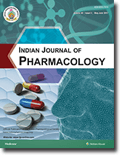
INDIAN JOURNAL OF PHARMACOLOGY
Empowering researchers with cutting-edge pharmacological discoveries.INDIAN JOURNAL OF PHARMACOLOGY, published by Wolters Kluwer Medknow Publications, is a premier platform dedicated to advancing the field of pharmacology and its related disciplines. With a rich history since its inception in 1978, this journal aims to disseminate high-quality research findings, reviews, and clinical studies that contribute to the global understanding of drug action and therapeutic practices. As a valuable resource for researchers, professionals, and students alike, it operates within the Q3 quartile of the Pharmacology category, positioning itself as an influential contributor in the realm of medical pharmacology. The journal is committed to publishing rigorous scientific inquiry, fostering innovation, and bridging gaps between laboratory research and clinical application. Readers can access its wide-ranging articles to stay informed about the latest advancements in the field, reflecting its crucial role in shaping future pharmacological research and practice.
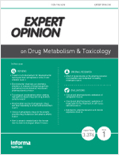
Expert Opinion on Drug Metabolism & Toxicology
Leading the Charge in Drug Metabolism InsightsExpert Opinion on Drug Metabolism & Toxicology, published by Taylor & Francis Ltd, is a leading journal in the fields of pharmacology and toxicology, with a distinguished reputation gleaned from its Q1 rankings in both disciplines as of 2023. With an ISSN of 1742-5255 and an E-ISSN of 1744-7607, this journal aims to foster innovative discussions and critical insights into the metabolism and toxicological assessment of drugs, appealing to a wide audience of researchers, professionals, and students. The journal's commitment to maintaining high academic standards is reflected in its placement within the top quartiles of the Scopus rankings—ranked 17th in Toxicology and 73rd in Pharmacology—demonstrating its significant impact and relevance in advancing knowledge within the drug development sector. Published since 2005 and converging into 2024, it provides a platform for timely dissemination of expert opinions, systematic reviews, and original research, reinforcing its vital role in shaping the future of pharmacological sciences in an ever-evolving landscape.